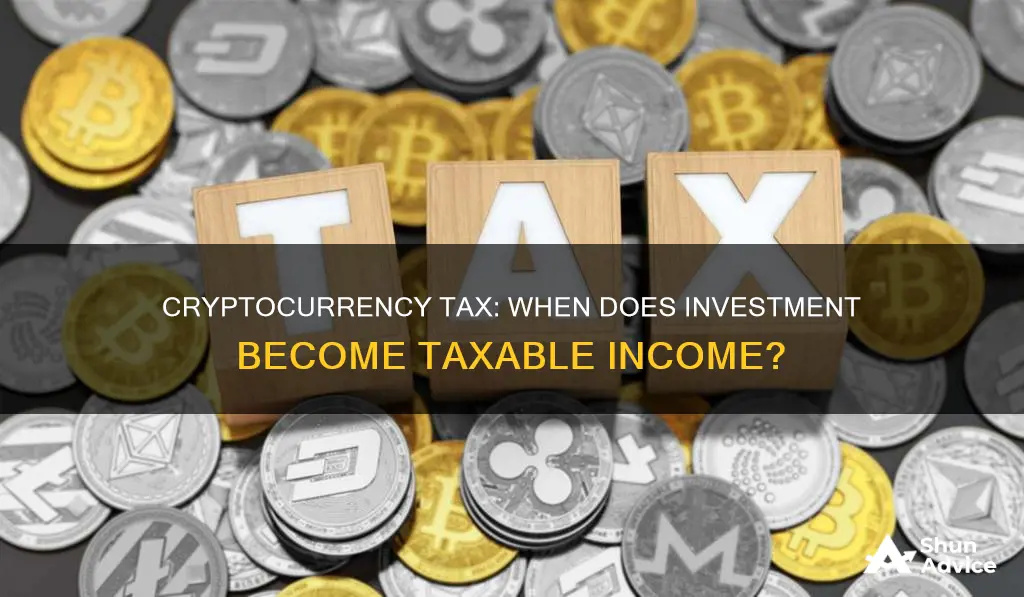
Cryptocurrency income is considered taxable income. The IRS treats cryptocurrencies as property for tax purposes, and the money you gain from crypto is taxed at different rates, either as capital gains or as income, depending on how you got your crypto and how long you held on to it.
If you sell crypto for a profit, you're taxed on the difference between your purchase price and the proceeds of the sale. This includes exchanging your crypto directly for another cryptocurrency, and using crypto to pay for goods or services.
If you acquired crypto from mining or as payment for goods or services, that value is taxable immediately, like earned income. You don't wait to sell, trade or use it before settling up with the IRS.
If you dispose of or use crypto by cashing it on an exchange, buying goods and services or trading it for another cryptocurrency, you will owe taxes if the realized value is greater than the price at which you acquired the crypto. You may have a capital gain that’s taxable at either short-term or long-term rates.
The IRS treats all cryptocurrencies as capital assets, and that means you owe capital gains taxes when they’re sold at a gain.
| Characteristics | Values |
|---|---|
| Cryptocurrency considered as | Digital asset, property, or capital asset |
| Taxable events | Selling crypto for cash, converting one crypto to another, spending crypto on goods and services, getting paid in crypto, getting crypto in exchange for goods or services, mining crypto, earning staking rewards, earning other income, getting crypto from a hard fork, getting an airdrop, receiving other incentives or rewards |
| Non-taxable events | Buying crypto with cash and holding it, donating crypto to a qualified tax-exempt charity or non-profit, transferring crypto to yourself, giving a gift |
| Tax calculation | Capital gains taxes or income taxes, depending on how the cryptocurrency is acquired and how long it is held |
| Tax rate | Depends on the total income for the year and how long the cryptocurrency is held for (i.e., short-term or long-term capital gains) |
| Tax forms | Form 1040, Form 1099-NEC, Form 8949, Schedule C, Schedule D, Schedule SE |

Cryptocurrency sales
The IRS treats cryptocurrencies as property for tax purposes. This means that any profits or income from your cryptocurrency is taxable. If you sell your crypto for a profit, you're taxed on the difference between your purchase price and the proceeds of the sale. This includes exchanging your Bitcoin directly for another cryptocurrency, and using Bitcoin to pay for goods or services.
The tax you pay depends on how you used your crypto and for how long you held it. If you held your crypto for more than a year before selling, you'll generally pay a lower rate than if you sold right away. Capital gains taxes are applied at both the federal and state levels.
If you receive cryptocurrency as payment for goods or services, you must report it as business income. If you are a cryptocurrency miner, the value of your crypto at the time it was mined counts as income.
If you sell your crypto for less than you bought it for, the amount of the loss can offset the profit from other sales.
Taxable Events
- Selling cryptocurrency for a fiat currency
- Using cryptocurrency to purchase goods or services
- Trading different types of cryptocurrency
Non-taxable Events
- Buying crypto with cash and holding it
- Donating crypto to a qualified tax-exempt charity or non-profit
- Giving a gift
- Transferring crypto to yourself
Bitcoin: Exploring Alternative Investment Opportunities
You may want to see also

Crypto income
The IRS treats cryptocurrencies as property for tax purposes. This means that any profits or income from your cryptocurrency is taxable. The type of tax you pay depends on how you acquired and used your cryptocurrency.
Income Taxes
If you receive cryptocurrency as payment for goods or services, it is taxed as ordinary income at its fair market value on the date you receive it. This also applies if you earn cryptocurrency through mining or staking.
Capital Gains Taxes
If you sell your cryptocurrency for a profit, you owe capital gains tax on that profit. Capital gains taxes are applied at both the federal and state level and can be long-term or short-term. How long you've held your crypto will affect how much tax you'll end up owing. If you held onto your crypto for more than a year before selling, you'll generally pay a lower rate than if you sold right away.
Taxable Events
Transactions that result in a tax are called taxable events. These include:
- Selling crypto for cash
- Converting one cryptocurrency to another
- Spending crypto on goods and services
- Getting paid in crypto
- Getting crypto in exchange for goods or services
- Mining crypto
- Earning staking rewards
- Getting crypto from a hard fork
- Getting an airdrop
- Receiving other incentives or rewards
Non-Taxable Events
On the other hand, the following are considered non-taxable events:
- Buying crypto with cash and holding it
- Donating crypto to a qualified tax-exempt charity or non-profit
- Receiving a gift of crypto
- Giving a gift of crypto (up to a certain amount)
- Transferring crypto to yourself
Strategic Cryptocurrency Investment: A Beginner's Guide to Crypto
You may want to see also

Crypto mining
Mining cryptocurrency creates multiple tax implications. The rewards from crypto mining are taxed as income when they are received. This means that, in most countries, you will pay income tax on your mining rewards. If you later sell, trade or spend your crypto mining rewards and make a gain, you may also be liable to pay capital gains tax.
The tax implications for crypto mining differ depending on whether you are mining as a hobby or as a business. If your mining activities constitute a trade or business, your income from crypto mining may also be subject to self-employment tax to cover social security and Medicare contributions.
If you are mining cryptocurrency as a hobby, you should report your income from mining on Form Schedule 1 (1040), line 8 as 'other income'. This income will be taxed at your regular income tax rate. However, you will not be able to claim any tax deductions for expenses incurred while mining crypto as a hobby.
If you are running a mining business, you will report your mining income on Form Schedule C (1040). You will be liable to pay self-employment tax, but you will also be able to claim tax deductions for business expenses. These expenses may include equipment costs, repair costs, and office space or a home office deduction.
It is important to keep detailed records of your crypto mining activities to ensure that you are accurately reporting and paying taxes on your mining rewards. Failing to report your crypto mining income or any gains from disposing of mining rewards is considered tax evasion and can result in penalties, fines, and even potential prison time.
KBC Coin: A Smart Investment Decision?
You may want to see also

Crypto staking
Staking rewards are considered taxable income and are subject to income tax. The IRS has ruled that staking rewards must be included in gross income for the taxable year in which the taxpayer acquires dominion and control of the awarded cryptocurrency. Dominion and control generally refer to the taxpayer's ability to sell or otherwise transfer the asset. The amount of includible income is based on the reward's fair market value on the date the taxpayer gains dominion and control. It's important to note that if you dispose of your staking rewards in the future, you may incur a capital gain or loss depending on how the price of your staking rewards has changed since you originally received them.
The tax treatment of staking rewards varies slightly depending on the country you reside in. For example, in the United States, the IRS treats staking rewards as taxable income. In Canada, the Canadian Revenue Agency has not released specific guidance, but since staking is similar to mining crypto, the received coins from staking are likely to be treated similarly to mining income. In the UK, HMRC treats staking rewards as income from crypto mining, and in Australia, the staking rewards are taxed as ordinary income.
To calculate your tax liability on staking rewards, you need to identify the fair market value of your staking rewards in your local currency on the date you received them. This value will be used to calculate your income tax liability. Additionally, if you dispose of your staking rewards by selling, trading, or spending them, you may realize a capital gain or loss, which will also be subject to tax.
It's important to consult with a tax professional or accountant familiar with cryptocurrency tax laws to ensure you're complying with the tax regulations in your country.
Investing in 1-Inch Crypto: A Good Idea?
You may want to see also

Crypto as payment
Cryptocurrency is considered a taxable asset, and the laws that apply to other assets also apply to it. This means that any profits or income from your cryptocurrency are taxable. If you use cryptocurrency to buy goods or services, you owe taxes on the increased value between the price you paid for the crypto and its value at the time you spent it, plus any other taxes you might trigger.
Cryptocurrency payment gateways allow businesses to accept transactions of cryptocurrencies as payment from customers in exchange for goods or services. These systems accept payments from any country and put an emphasis on security due to the nature of blockchain-based cryptocurrencies.
When a customer makes a purchase using a cryptocurrency as payment, the transaction often goes through the payment gateway at a fixed exchange rate and automatically converts to a traditionally recognised fiat currency so the merchant can avoid the volatility of the cryptocurrency markets. However, some cryptocurrency payment gateways do not automatically transfer the cryptocurrency to fiat currency, allowing the merchant to hold the digital coins as long as they prefer, usually inside a cryptocurrency wallet.
Cryptocurrency payment gateways tend to offer lower fees than traditional credit card payment systems. Some of these tools can be highly customizable and provide native dashboards to help track all payments. Bitcoin is the most commonly supported cryptocurrency used during transactions with these systems, but some gateways provide the ability to pay with alternative cryptocurrencies, such as Ether, Litecoin, and Bitcoin Cash, among others.
There are several crypto apps and payment gateways that allow users to pay with crypto, such as BitPay, Coinbase Commerce, Coinomi, and Crypto.com Pay. These apps allow users to buy, store, swap, and spend cryptocurrency all in one app. They also offer features such as crypto debit cards, automatic cashback, and rewards for spending crypto.
Civic Coin: A Smart Investment Decision?
You may want to see also
Frequently asked questions
In the U.S., any money gained from crypto is taxed at different rates, either as capital gains or as income, depending on how you acquired your crypto and how long you held onto it.
Taxable events include selling crypto for cash, spending crypto on goods and services, getting paid in crypto, and mining crypto.
Non-taxable events include buying crypto with cash and simply holding it, donating crypto to a qualified tax-exempt charity or non-profit, and transferring crypto to yourself between wallets or accounts.
This depends on your income tax bracket, how long you've held your crypto, and whether your gains are short-term or long-term. Short-term capital gains are usually taxed at a higher rate than long-term gains.
One way is to hold onto your Bitcoin for more than a year before selling, as short-term capital gains taxes are typically higher. You can also offset gains with losses from other investments, time your sale to take advantage of a lower tax rate, and claim mining expenses if applicable.







